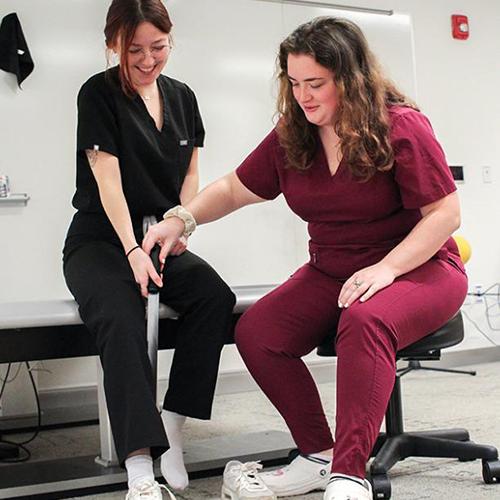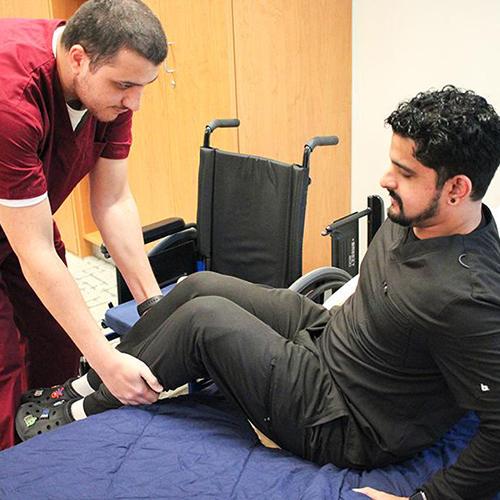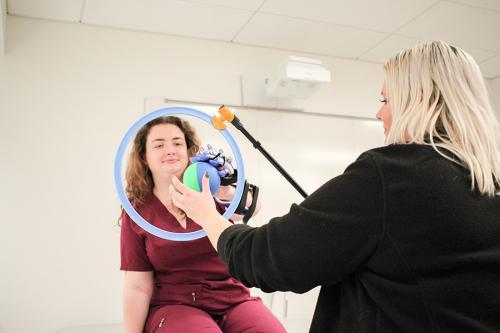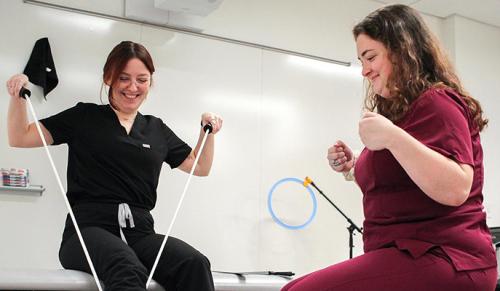What is an Occupational Therapist?
An occupational therapist (OT) is a client-centered health care professional who focuses on what their clients want and need to do in their daily lives. OTs have a holistic perspective which recognizes the whole person and the interdependence of mind, body and spirit in planning OT services. This includes helping their clients develop the necessary functional skills, adapting work environments and modifying tasks. This empowers their clients to meaningfully participate in their self-care routine, home and family lives, educational opportunities and community or leisure activities.
What Does an Occupational Therapist Do?
Occupational therapists work with people of all ages who have identified mental or physical disabilities or have experienced serious injuries or illnesses by providing direct therapeutic services to individuals and groups. They also provide health promotion and prevention services to persons across the lifespan using a population health multi-tiered model of service provision.
An OT helps people improve and maintain their gross and fine motor skills, sensory processing, visual-spatial processing and social and cognitive skills. This helps their clients to tackle essential activities like completing chores, time management, finishing homework, or participating in shared activities with friends or family members. When clients develop or regain the skills required to participate in essential life activities, they reclaim their autonomy, self-efficacy and confidence while also nurturing their health and well-being.
Occupational therapists conduct systematic evaluations to assess how their clients’ disabilities, injuries or conditions may interfere with their ability to participate in the essential activities of their lives. The evaluation includes analyzing how clients’ personal capacities have been impacted, the task demand and the performance context of their lives including their living, working and community environments. This evaluation may be conducted for individuals, groups or populations.
With the results of an evaluation, the OT determines if their services are needed. If so, the evaluation results are used to identify specific goals to promote clients’ development of functional abilities, habits and routines, adapt tasks or recommend environmental redesign. With the identified goals and client priorities, interests and values in mind, the OT collaborates with clients to create an intervention plan.
Occupational therapists use their specialized skills to:
- adapt, redesign or modify everyday activities so that a client can participate in them;
- modify work, living or educational spaces and equipment to make performance and participation easier, safer and effective;
- change the social context, environmental features or demands so that the clients can participate successfully;
- teach alternate ways to perform important tasks including getting dressed, preparing meals, managing work tasks in ways that protect joint health;
- guide clients’ in modifying and developing routines and habits to promote active, effective and satisfying engagement in occupations across a person’s daily life;
- recommend medical aids and adaptive equipment and teach clients how to use them;
- instruct family members and caretakers on how to best support, assist and engage with their loved ones;
- develop plans for building skills for memory, attention, executive function, social participation, physical/emotional regulation, perception, as well as physical strength, endurance, mobility, and dexterity.
Where Do Occupational Therapists Work?
Because occupational therapists attend to a variety of clients all with unique needs, OTs may work in numerous work environments, such as:
- Acute care and specialized hospitals
- K-12 schools and after-school programs
- Occupational therapy or Interprofessional private practices
- Nursing homes
- Outpatient clinics
- Rehabilitation centers
- Mental health community centers including homeless centers
OTs may also work with clients in their homes, work and school spaces to ensure these environments are accessible and support their overall rehabilitative goals.
How to Become an Occupational Therapist
Occupational Therapists’ Education Requirements
A master’s degree in occupational therapy is the minimum education required to become a licensed and practicing occupational therapist.
Prospective occupational therapists must first earn a bachelor’s degree to gain admission into an occupational therapy graduate program. Many occupational therapy graduate programs do not require a specific undergraduate degree. However, students may find it helpful to pursue a bachelor’s degree in a health care or social science major such as neuroscience, biology, kinesiology/exercise science, psychology, public health, or health & wellness. It is common for OT programs to require successful completion of pre-requisite courses in anatomy and physiology, psychology, sociology, anthropology or other introductory health care courses.
Licensure Requirements for Occupational Therapists
To become a practicing occupational therapist, you must be licensed. OT licensure differs by state, but each state requires prospective occupational therapists to pass the National Board for Certification in Occupational Therapy (NBCOT) exam to secure the title “Occupational Therapist, Registered” (OTR). This also secures their national board certification.
The New York State Education Department (NYSED) requirements for Occupational Therapist Certification include:
- a master’s degree in occupational therapy or post-baccalaureate certificate in occupational therapy from an institution acceptable to NYSED from a New York State Registered or American Occupational Therapy Association (AOTA)-accredited Occupational Therapist program;
- a minimum of six months of supervised occupational therapy experience;
- a passing score of 450 on the NBCOT OTR exam;
- must be 21 years of age to obtain occupational therapist licensure.
Find the contact information for your state’s licensing board.
Employment Outlook and Earning Potential for Occupational Therapists
The employment outlook for occupational therapists shows promising growth. The U.S. Bureau of Labor Statistics projects that occupational therapist employment will grow by 14 percent over the next decade, outpacing the national average for all occupations, which is five percent. This projected growth translates into an estimated 10,100 OT job openings per year.
The median annual salary for occupational therapists is $85,570 but can range from $60,680 to $123,840. An occupational therapist’s earning potential depends heavily upon the type of facility in which they work. For instance, OTs working in elementary and secondary schools earn $77,290 on average, while those working in home health care services earn $98,7000 annually.
Earn Your Master of Science in Occupational Therapy at Iona University
Iona University’s Master of Science in Occupational Therapy degree prepares students to begin their career as an occupational therapist in a wide range of settings including public schools, hospitals, private practices, outpatient clinics, and home care and community-based practices. Iona’s signature educational features create future occupational therapists who are ethical, community minded and entrepreneurial and are prepared for and excited about interprofessional collaborative practice.
Our graduate occupational therapy degree program integrates OT focused service-learning experiences with OT didactic coursework. These engaging, community-based experiences add meaning, extend academic learning and support the integration of professional skills and identity. Students also enjoy on-campus experiential learning opportunities in state-of-the-art occupational therapy labs using the latest technology to gain hands-on practice experience.
Opportunities for additional interprofessional learning experiences in high-fidelity simulation labs are included in the program, and students interface with Iona's Office of Interprofessional Education Program throughout their entire graduate education. In the process of working on interprofessional teams, students learn about team roles, practice collaboration and explore interprofessional values and ethics. Interprofessional paid fellowship opportunities engage students in community-based services that further deepen their professional development, passion and readiness.
In addition, Iona’s OT program collaborates with the faculty and staff of the Hynes Institute for Entrepreneurship and Innovation to provide students with unique learning opportunities for developing an entrepreneurial mindset and building their skills for innovative practice across settings, including using their OT skills as entrepreneurs and social entrepreneurs.
The MS in Occupational Therapy program is accredited by the Accreditation Council for Occupational Therapy Education (ACOTE) which ensures students are prepared to sit for the National Board for Certification inn Occupational Therapy (NBCOT) exam.
Iona’s occupational therapy master’s program offers a highly integrative and hands-on education to support OT students as they develop entry-level OT competencies while also growing as ethical, collaborative, entrepreneurial, and community-minded leaders in their practice settings, communities, and professional organizations.
Take the Next Step to Become an Occupational Therapist
Working as an occupational therapist gives you the opportunity to provide holistic services to people with a variety of disabilities, injuries and disorders. With your highly-specialized skills and expertise, you are equipped to design programs and services to help individuals and groups cultivate or return to their meaningful daily lives.
Iona’s Master of Science in Occupational Therapy degree program prepares students to emerge as leaders in the occupational therapy field and embark on a rewarding, people-focused career path.
Learn more about Iona’s graduate program offerings by requesting information.
Ready to begin your journey to becoming an OT? Start your application today!






